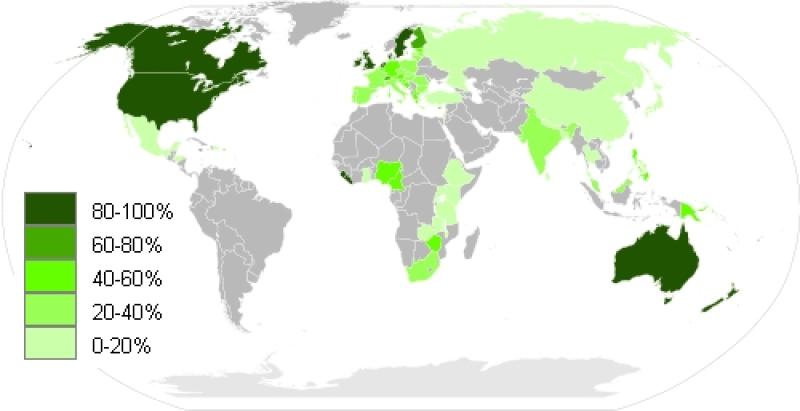How many people speak English as their second language?
Worldwide, approximately 1.5 billion people speak English as a second language (ESL).
Here's a breakdown to put it in context:
Native English speakers: About 370 million to 400 million people.
People who speak English as a second or additional language: Roughly 1.5 billion.
So, English learners and users who are not native speakers vastly outnumber native speakers. This large ESL population includes people using English for business, education, travel, and communication globally.
The Global Reach of English: A Deep Dive into ESL
English has transcended its origins to become a global lingua franca, connecting people from diverse cultures and backgrounds. This widespread adoption has led to a massive population of English as a Second Language (ESL) speakers, and their proficiency is reshaping global communication and interaction. Let's explore the key facets of this phenomenon.
How Many People Speak English as a Second Language Globally?
While it's difficult to get a precise, real-time number, estimates from various sources generally place the number of ESL speakers at a staggering 1 billion to 1.5 billion people. This figure far exceeds the number of native English speakers, which is estimated to be around 400 million. This means that for every one native speaker, there are roughly two to three people who have learned English as an additional language.
Which Countries Have the Largest ESL Populations?
The countries with the largest ESL populations are often those with large populations in general, as well as those where English is used in education, business, and government, but is not the primary language. While specific rankings can vary depending on the study, some of the top countries with the most English speakers (as a second language) include:
India: With a population of over 1.4 billion and a legacy of British colonialism, English is an official language and is widely used in government, business, and higher education.
China: The country's economic rise and global integration have led to a massive push for English education. Hundreds of millions of people are learning English in schools and through private tutoring.
Pakistan: Similar to India, English holds an official status and is used extensively in professional and educational settings.
The Philippines: English is an official language, and the country has a high proficiency rate. It's often used in government, media, and commerce.
Nigeria: With over 500 different languages, English serves as a crucial unifying language for the country and is an official language.
How Has English Become a Global Lingua Franca?
The rise of English as a global language is a multifaceted phenomenon driven by several historical and contemporary factors:
Historical Influence: The British Empire spread the English language across the globe through colonization, establishing its use in administration and education in places like India, Australia, and parts of Africa.
Economic Dominance: After World War II, the United States emerged as a dominant economic and political power. The rise of American business, Hollywood, and popular culture further cemented English's place as the language of commerce, entertainment, and innovation.
Technological Advancements: The internet and the digital age have propelled English even further. Much of the early internet content, coding languages, and scientific research was, and still is, published in English.
Higher Education: Many of the world's top universities are in English-speaking countries, and a significant portion of academic literature is published in English, making it essential for international students and researchers.
What Are Challenges Faced by ESL Learners?
Learning a second language is a rewarding but challenging journey. ESL learners often encounter specific hurdles:
Pronunciation and Accent: English has many sounds that don't exist in other languages, making pronunciation difficult. Regional accents can also be a significant barrier to comprehension.
Idioms and Slang: The English language is rich with idioms (e.g., "it's raining cats and dogs") and slang, which can be confusing and don't always translate literally.
Grammatical Complexity: English grammar can be notoriously tricky, with irregular verbs, phrasal verbs, and subtle rules that are not always intuitive.
Cultural Context: Language is deeply tied to culture. Understanding the cultural nuances behind certain phrases or social cues is often as important as knowing the words themselves.
Confidence and Fluency: Many learners struggle with the confidence to speak, fearing making mistakes. Achieving conversational fluency requires consistent practice and overcoming this fear.
How Does ESL Proficiency Impact Global Communication?
The proficiency of ESL speakers has a profound impact on global communication and connectivity:
Bridging Communication Gaps: English acts as a common ground, enabling people from different linguistic backgrounds to collaborate in business, diplomacy, science, and the arts.
Economic Opportunities: Proficiency in English can open doors to better job prospects, higher wages, and international business opportunities. It's often a prerequisite for working in multinational companies.
Cultural Exchange: While English can sometimes dominate, it also serves as a vehicle for cultural exchange. Through English, people can share their own cultures and learn about others.
Access to Information: A large portion of global information, from scientific research to news and entertainment, is available in English, making proficiency a key to accessing this knowledge.
In an increasingly interconnected world, the role of English as a second language is more critical than ever. The continued growth of the ESL population will undoubtedly shape how we communicate and cooperate on a global scale.












